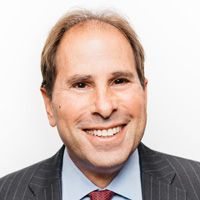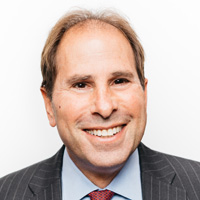5 Investment Resolutions to Make for 2023
From venturing out of your comfort zone to taking an objective look at your portfolio, now is a great time to develop some new, financially healthy habits.


Profit and prosper with the best of Kiplinger's advice on investing, taxes, retirement, personal finance and much more. Delivered daily. Enter your email in the box and click Sign Me Up.
You are now subscribed
Your newsletter sign-up was successful
Want to add more newsletters?

Delivered daily
Kiplinger Today
Profit and prosper with the best of Kiplinger's advice on investing, taxes, retirement, personal finance and much more delivered daily. Smart money moves start here.

Sent five days a week
Kiplinger A Step Ahead
Get practical help to make better financial decisions in your everyday life, from spending to savings on top deals.

Delivered daily
Kiplinger Closing Bell
Get today's biggest financial and investing headlines delivered to your inbox every day the U.S. stock market is open.

Sent twice a week
Kiplinger Adviser Intel
Financial pros across the country share best practices and fresh tactics to preserve and grow your wealth.

Delivered weekly
Kiplinger Tax Tips
Trim your federal and state tax bills with practical tax-planning and tax-cutting strategies.

Sent twice a week
Kiplinger Retirement Tips
Your twice-a-week guide to planning and enjoying a financially secure and richly rewarding retirement

Sent bimonthly.
Kiplinger Adviser Angle
Insights for advisers, wealth managers and other financial professionals.

Sent twice a week
Kiplinger Investing Weekly
Your twice-a-week roundup of promising stocks, funds, companies and industries you should consider, ones you should avoid, and why.

Sent weekly for six weeks
Kiplinger Invest for Retirement
Your step-by-step six-part series on how to invest for retirement, from devising a successful strategy to exactly which investments to choose.
New Year’s resolutions are an annual ritual for many, with health-related resolutions among the most common. In the spirit of the season, investors should consider making (and sticking to) 2023 New Year’s investment resolutions to lead a healthier investment life.
The following resolutions may reduce stress and improve investment performance:
1. Go on a “Media Diet.”
The “activity bias” is a common behavioral pattern among investors who closely follow the day-to-day (or minute-to-minute) activity in the markets. Many investors would benefit from finding a healthier balance between being well informed and being overly stimulated by market news.
From just $107.88 $24.99 for Kiplinger Personal Finance
Become a smarter, better informed investor. Subscribe from just $107.88 $24.99, plus get up to 4 Special Issues

Sign up for Kiplinger’s Free Newsletters
Profit and prosper with the best of expert advice on investing, taxes, retirement, personal finance and more - straight to your e-mail.
Profit and prosper with the best of expert advice - straight to your e-mail.
Investors who struggle to find that balance often trade more frequently than is advisable, leading to adverse performance and tax consequences.
Consuming less business and political news may be a healthy resolution for those who find themselves bingeing on the latest tweets, broadcasts and articles.
2. Spend Less Time in “Echo Chambers.”
Confirmation bias is the tendency to seek evidence that supports preexisting beliefs and to interpret information in a way that supports an existing position. The echo chamber that comes from avoiding contrary viewpoints can lead to costly investment mistakes.
Seeking contrary points of view is a necessary step in testing an investment point of view and an important (and perhaps uncomfortable) resolution for 2023.
3. Take an Objective Look at Your Portfolio.
The New Year is a logical time to evaluate your current investment holdings. Some recent winners may have benefitted from a favorable market environment and may not be able to sustain their success. If recent success isn’t sustainable, it may be time to look for opportunities to upgrade the holding to an investment with superior prospects.
The same analysis should be applied to less successful positions. Evaluating whether losing positions are likely to recover is a critical aspect of portfolio management. Oftentimes, recent laggards are tomorrow’s leaders. But some investments that seem cheap today can get a lot cheaper!
In a rapidly changing environment, it is important to be vigilant about winning and losing investment holdings.
4. Ask the Right Question(s).
Investment discussions in January are dominated by forecasts for the coming year. The most common question is: “What do you expect the market to do this year?”
Although the natural impulse is to focus on the one-year outlook, for most investors the focus on a relatively short-term time horizon is counterproductive. Investors should start the year with a budget and investment allocation that takes into consideration known cash needs and an emergency reserve for unexpected cash needs.
Beyond those near-term cash needs, the remainder of the portfolio should be invested in alignment with long-term financial and personal goals. The right questions to ask integrate investments with financial planning objectives, focusing on long-term objectives.
Realistically, once cash needs are taken care of, most investors have time horizons measured in years, if not decades.
The unreliable “crystal ball” for investment performance over one-year periods becomes more reliable over longer periods, making investment planning a less stressful exercise.
5. Read a Book.
The final suggested resolution to start the year is: Read a book! There are several books that provide sound advice about how to be a more self-aware and effective investor.
Daniel Kahneman was awarded a Nobel Prize in 2002 for findings that challenged assumptions of human rationality prevailing in modern economic theory. Kahneman’s Thinking, Fast and Slow summarizes decades of research and explains patterns of thinking that influence decision-making.
Investor and Columbia Business School adjunct professor Michael Mauboussin has done considerable work on behavioral finance and on assessment of success and failure in investing. Mauboussin’s The Success Equation: Untangling Skill and Luck in Business, Sports, and Investing provides insight into the roles both skill and luck may play in investment success and how to better distinguish between the two.
Making New Year’s investment resolutions may increase the likelihood of long-term investment success. Staying on track with resolutions is easier said than done.
The likelihood of staying on track is higher for people who make themselves accountable for their resolutions, so it may be helpful to put resolutions in writing and keep them in a visible place as a constant reminder.
Registration with the SEC should not be construed as an endorsement or an indicator of investment skill, acumen, or experience. Investments in securities are not insured, protected, or guaranteed and may result in loss of income and/or principal. Unless stated otherwise, any mention of specific securities or investments is for hypothetical and illustrative purposes only. Adviser’s clients may or may not hold the securities discussed in their portfolios. Adviser makes no representations that any of the securities discussed have been or will be profitable.
Profit and prosper with the best of Kiplinger's advice on investing, taxes, retirement, personal finance and much more. Delivered daily. Enter your email in the box and click Sign Me Up.

Daniel S. Kern, CFA®, CFP®, chief investment officer of Nixon Peabody Trust Company, is responsible for overseeing the firm’s investment process, research activities and portfolio strategy. He previously was the managing director and chief investment officer of TFC Financial Management. Earlier in his career, Dan was head of asset allocation at Charles Schwab Investment Management and managed global and international equity portfolios for Montgomery Asset Management. He is a contributor to TheStreet.com and ThinkAdvisor.com and a regular guest on Bloomberg’s Baystate Business and TD Ameritrade Network.
-
 Nasdaq Leads a Rocky Risk-On Rally: Stock Market Today
Nasdaq Leads a Rocky Risk-On Rally: Stock Market TodayAnother worrying bout of late-session weakness couldn't take down the main equity indexes on Wednesday.
-
 Quiz: Do You Know How to Avoid the "Medigap Trap?"
Quiz: Do You Know How to Avoid the "Medigap Trap?"Quiz Test your basic knowledge of the "Medigap Trap" in our quick quiz.
-
 5 Top Tax-Efficient Mutual Funds for Smarter Investing
5 Top Tax-Efficient Mutual Funds for Smarter InvestingMutual funds are many things, but "tax-friendly" usually isn't one of them. These are the exceptions.
-
 Social Security Break-Even Math Is Helpful, But Don't Let It Dictate When You'll File
Social Security Break-Even Math Is Helpful, But Don't Let It Dictate When You'll FileYour Social Security break-even age tells you how long you'd need to live for delaying to pay off, but shouldn't be the sole basis for deciding when to claim.
-
 I'm an Opportunity Zone Pro: This Is How to Deliver Roth-Like Tax-Free Growth (Without Contribution Limits)
I'm an Opportunity Zone Pro: This Is How to Deliver Roth-Like Tax-Free Growth (Without Contribution Limits)Investors who combine Roth IRAs, the gold standard of tax-free savings, with qualified opportunity funds could enjoy decades of tax-free growth.
-
 One of the Most Powerful Wealth-Building Moves a Woman Can Make: A Midcareer Pivot
One of the Most Powerful Wealth-Building Moves a Woman Can Make: A Midcareer PivotIf it feels like you can't sustain what you're doing for the next 20 years, it's time for an honest look at what's draining you and what energizes you.
-
 I'm a Wealth Adviser Obsessed With Mahjong: Here Are 8 Ways It Can Teach Us How to Manage Our Money
I'm a Wealth Adviser Obsessed With Mahjong: Here Are 8 Ways It Can Teach Us How to Manage Our MoneyThis increasingly popular Chinese game can teach us not only how to help manage our money but also how important it is to connect with other people.
-
 Looking for a Financial Book That Won't Put Your Young Adult to Sleep? This One Makes 'Cents'
Looking for a Financial Book That Won't Put Your Young Adult to Sleep? This One Makes 'Cents'"Wealth Your Way" by Cosmo DeStefano offers a highly accessible guide for young adults and their parents on building wealth through simple, consistent habits.
-
 Global Uncertainty Has Investors Running Scared: This Is How Advisers Can Reassure Them
Global Uncertainty Has Investors Running Scared: This Is How Advisers Can Reassure ThemHow can advisers reassure clients nervous about their plans in an increasingly complex and rapidly changing world? This conversational framework provides the key.
-
 I'm a Real Estate Investing Pro: This Is How to Use 1031 Exchanges to Scale Up Your Real Estate Empire
I'm a Real Estate Investing Pro: This Is How to Use 1031 Exchanges to Scale Up Your Real Estate EmpireSmall rental properties can be excellent investments, but you can use 1031 exchanges to transition to commercial real estate for bigger wealth-building.
-
 The 8 Stages of Retirement: An Expert Guide to Confidence, Flexibility and Fulfillment, From a Financial Planner
The 8 Stages of Retirement: An Expert Guide to Confidence, Flexibility and Fulfillment, From a Financial PlannerRetirement planning is less about hitting a "magic number" and more about an intentional journey — from understanding your relationship with money to preparing for your final legacy.